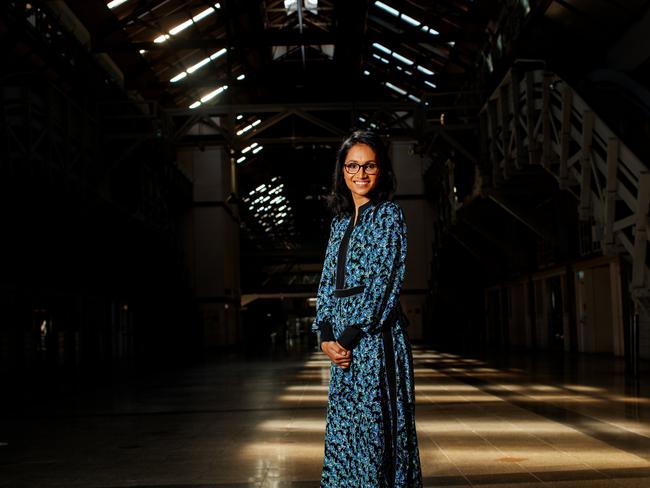Read a review of the Miles Franklin prize winner, Chai Time at Cinnamon Gardens
Shankari Chandran has won the 2023 Miles Franklin Award with her novel that uses a run-down nursing home and a family looking for a new beginning as the set-up for an exploration of community and diversity.

Chai Time at Cinnamon Gardens is set in a nursing home in the fictional suburb of Westgrove, in western Sydney. The home is owned by family matriarch Maya, who is now a resident.
Maya and her husband Zakhir, along with their twins Anji and Siddharth, arrived in Australia in the early 80s from northern Sri Lanka amid the threat of the onset of the civil war that would tear their country apart.
So, a run-down nursing home, a family looking for a new beginning – this becomes the set-up for an exploration of community and diversity.

As Maya’s past is revealed so too is the history of Sri Lanka’s civil war. Maya’s home town of Jaffna in the north is the ancestral capital of the Tamil kingdom and was also the capital of Tamil Eelam, the proposed separate Tamil state that the Liberation Tigers of Tamil Eelam fought for from 1983 to 2009.
The chapters set in Jaffna, when Maya meets her husband Zakhir in the 70s, are full of charm. Zakhir is a professor of archaeology, just like Maya’s father. The two men share a commitment to preserving the evidence and history of ancient Tamil temples and sacred sites.
However their version of Sri Lanka’s history goes against the government’s. It’s an argument over territorial legitimacy from which Maya’s father refuses to back down.
There is a lot of interesting history peppered throughout the book, artfully written into the dialogue and descriptions. Author Shankari Chandran is of Tamil descent and in Chai Time at Cinnamon Gardens she leans into both the beauty and brutality of her ancestral homeland.
Deep into the book’s narrative, and 20 years later in Sri Lankan history, the descriptions of the torture of Tamil Tigers in the jungles near Jaffna are sharp and painful to read.
But this book is more than a history lesson. Chandran is an excellent storyteller.
The plot moves from Sri Lanka during the civil war, back to a time before that country was riven apart, and then forwards to present day Westgrove.
There are five main characters and their stories are punctuated by chapter breaks.
Anji, Maya’s daughter, has taken over running the nursing home. She works alongside best friend and geriatrician, Nikki. Nikki is married to local councillor Gareth. Theirs is a story of private tragedy and a marriage in trouble.
Then there’s Ruben, the 40-something language professor from Jaffna University, who now lives and works at the nursing home. The truth about the scars across Ruben’s body are revealed in his story. A shared connection to Cinnamon Gardens is what binds these characters together and human frailty and racism rips them apart.
Ruben is attacked by racist thugs and the ongoing targeted assaults are downplayed by the local police as random acts of minor violence. Gareth’s bigotry exacerbates the locals’ growing distrust of Westgrove’s migrant community and particularly his wife’s family’s nursing home.
He hides behind the power of white male privilege, helped by a glut of misinformation spread by a local media intent on chasing headlines.
Chandran balances the weighty themes of the impact of colonisation, the dispossession of a people, and the struggle for self-determination with the story of intimate relationships. Through the eyes of her characters Chandran examines how trauma unravels and changes a person. Each character’s story is told with compassion, whether they are victim or bully, each gets an equal voice.
Chandran’s writing style follows the ebb and flow of the narrative; languorous and decorative when the story is unfolding and place is introduced, pinched and staccato when the action is disruptive and violent.
The narrative picks up pace in the final chapters as the five lives collide with increasing tension. Cinnamon Gardens and all who live and work there become a target.
This book is a vehicle for Chandran to explore issues of prejudice, of belonging and of race. Chandran is direct about where the wrongs lie and with whom but she doesn’t assert the truth of one history over the other, only that, as Maya’s father says, ‘possession of land is nine-tenths of the law, but possession of history is nine-tenths of the future’.
Chandran says she hopes readers take away a different perspective about life in Australia and an awareness that their experience is not the same as others. Chai Time at Cinnamon Gardens achieves this through rich storytelling.
Emma Harcourt writes historical fiction. Her second book, The Brightest Star, will be out in July 2022. Chai Time at Cinnamon Gardens by Shankari Chandran (Ultimo Press, Fiction, 384pp, $32.99).

To join the conversation, please log in. Don't have an account? Register
Join the conversation, you are commenting as Logout